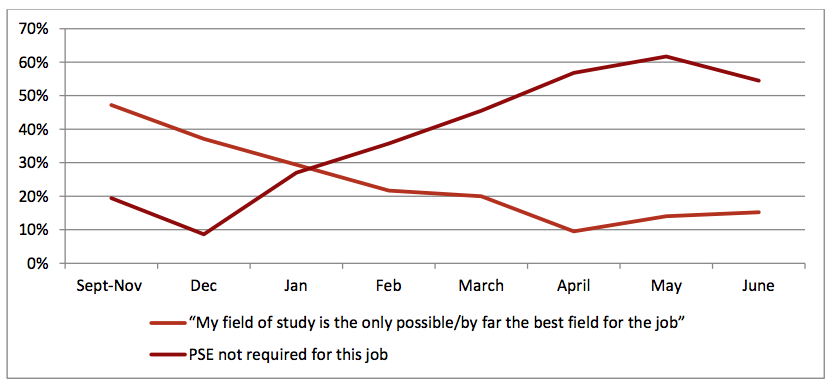It’s that time of year when the policy focus within PSE shifts – ever so briefly – to the issue of student summer employment. It’s a predictable news cycle: articles about the difficulties students are having finding jobs, government press releases about programs being rolled out this year, a couple of special Statscan releases, and it’ll be back to normal by mid-July. But despite the topic being a perennial one, we actually know very little about the student summer labour market other than some fairly basic stuff around employment rates.
Until now. Today, we’re releasing a little piece my colleague Edyta Kaznowska and I have been working on looking at the question of how students search for summer jobs. And the results are pretty interesting.
The most important finding is that only a minority of students actually enter the job market each summer. Just under 58% of all students who work in the summer are working in positions they have previously held. In some cases, that means they are going back to work at jobs they held in previous summers, but in a substantial number of cases, they are simply continuing in a job they held during the school year. For them, there is not so much a summer job market as a year-round job market with some seasonality in terms of intensity.
Primarily, though, we looked at how students search for jobs and how differences in job search tactics lead to different outcomes. The story is pretty much what common sense would tell you. Those who start their job search early tend to do better on a range of outcomes: employment rates, likelihood of working full-time, wages, etc. The 6% of students who start looking before December have a major advantage over those who wait until the new year, and students who start in March have a similar advantage over those who start in April. And waiting until May to start looking is just a recipe for disappointment.
But summer jobs are about more than money; they can also contribute significantly to a student’s education if they are related to a student’s field of study. And here, the results are unequivocal: the longer a student waits, the likelier it is they’ll end up in a job where PSE is not a prerequisite.
Relationship Between Work and Program of Study by Job Search Start Date (Excluding Students Returning to Old Jobs)

If your son or daughter is only just starting their job search, it might be best not to show them this – no adding to the downer. But maybe next fall, it’ll be worth pulling this out to underline the old adage: in summer jobs, the early bird really does get the worm.

 Tweet this post
Tweet this post

One response to “New Summer Employment Data”